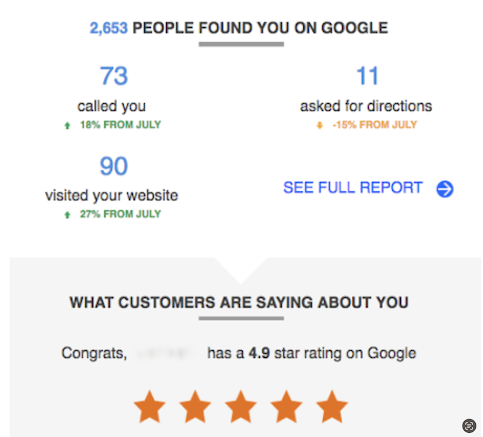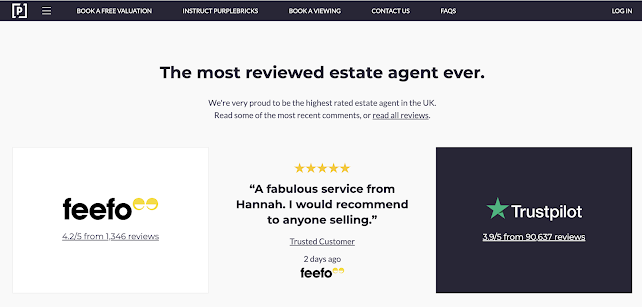We spend a lot of time telling you the facts about reviews and review management, but what about the psychology underlying consumers' interaction with reviews? With well over a decade's experience moderating thousands of reviews every month, here is the distillation of those imponderables that results in HelpHound's review solution standing head-and-shoulders above the rest.
1. Scores matter
When we meet businesses for the first time they will do all they can to justify or excuse their [Google] score. We hear all of the following...
- 'No one ever says they wouldn't use us because of our low score or the negative reviews underlying it.'
- 'Scoring 5.0 - or even near to 5.0 - means a business is manipulating the system, we're sure consumers aren't attracted to such businesses.'
- 'We get all our business by word-of-mouth, so our Google score doesn't really matter.'
- 'We welcome negative reviews.'
The psychology:Believe it or not, consumers overwhelmingly do want to deal with perfect businesses - or as near perfect as they can find. A business scoring 5.0 will get more clicks and calls than a business scoring 4.9. A business scoring 4.9 will get many more than a business scoring 4.6. Guaranteed*. No one calls a business to tell it that they've been put off contacting it by their negative reviews, but any business that thinks negative reviews don't deflect calls and clicks is deluding itself. Even word-of-mouth customers, however highly recommended by friends or colleagues who have used the business, will be put off by low Google scores and the attendant negative reviews. And, by the way, the second response - 'manipulating...' is often correct. Read on to hear more about that.
* 'Guaranteed'? Yes. And we - and you - can proove it. Try HelpHound for six months and if you GMB monthly report is not showing an uplift in calls and clicks then we'll refund your joining fee.
2. Responses matter
So many businesses either don't bother to respond at all or only respond to negative reviews.
The psychology:Consumers read responses. Those responses, if worded carefully, can turn a browser into a potential customer, even if it's a response to a negative review. Perhaps most important of all, when a disgruntled customer is looking to post a negative review, seeing that the business will inevitably respond will keep that customer's review genuine. Many people are initailly tempted to exaggerate when posting a negative review, just to support their 1* rating - that's only human nature - but seeing that their review will definitely elicit a response will inevitably temper that exaggeration (and often it will mean they decide not to post at all).
3. Review sites are a waste of a business's time and money
So often we hear 'We score 4.9 on [Trustpilot/Feefo/Yelp/Reviews.io]'. And that's unsurprising given just how many advertisements reference them: 'We're rated excellent on [review site].'
Trustpilot? Oh yes - it makes it onto this chart...
The psychology:The - very basic - psychology of reviews, from a business's point-of-view, is as follows: 'We have few/negative reviews: reviews are rubbish and no one pays a blind bit of attention to them.' or the exact opposite: 'We have many positive reviews: reviews are the life blood of our business.' But then there's the subset: the business that has accepted that reviews are a 'good thing' but has been sold an alternative to Google reviews. We think the chart above answers that question, but it has not prevented tens of thousands of businesses subscribing to the likes of Trustpilot - at a minumum of £200 a month. The logic? Part copying near competitors, part just being 'sold' by the review site.
Consumers love reviews, and rely on them, especially when making vital choices - medical, financial, legal and big-ticket (property purchase, for instance). But they can only be influenced by two kinds of review...
- reviews they see - and Google reviews show in every search on every business, review sites' reviews rarely feature in search
- reviews they trust - and Google reviews are trusted more than any other (and with good reason - their reviewers are traceable to an individual Google user).
The psychology:We meet so many business people who minimise the impact of negative reviews. Of course they do - who wants to believe that a negative review of their business is going to cause significant financial harm? But they do. Sometimes at the margin, sometimes in ways that stop a business dead in its tracks. Because consumers do trust them.
Business people owe it to themselves, their colleagues and their potential customers to do everything in their power to ensure that the absolute minimum of factually incorrect or potentially misleading reviews ever make it as far as Google.
But here we come to another crucial point: show us a business scoring 4.8 or better with 100+ reviews and we'll show you a business that is flouting - intentionally or unwittingly - one of more of the CMA's regulations. Why? Because they know they need a great score but they are worried that by complying with the law - by allowing all of their customers to write a review - they will attract factually inaccurate, potentially misleading or just plain unfair negative reviews.
Another point: the higher the Google score the more a business's negative reviews will be read. Why? Because consumers will filter out all the low(er) scoring businesses by just looking at their score, only when they have a 'shortlist' of high-scoring businesse will they begin to read the reviews - and always 'Lowest' first.
So, for the solution, on to point 5.
5. Moderation is vital
Allowing reviewers to post reviews directly to your website is the only way to benefit from moderation. We cannot stress this enough. If a business invites customers to post reviews direct to Google they risk severe harm (of the kind linked to at the end of the first paragraph of point 4. A business may be perfect, but all of its customers most certainly won't be.
Most mechanisms businesses use to mitigate against this kind of review are illegal, at least in the UK (it is against the law to only invite reviews from known 'happy' customers and it is equally illegal to pre-qualify customers before inviting them to write reviews - by sending them a questionnaire, for instance).
The psychology:If you accept points 1 to 4, then you know you owe it to your business to adopt moderated review management. Even if that only prevents one really harmful review a year from appearing in a Google search it will have been more than worth the effort - and expense; emotionally and psychologically business people, especially business owners - who are, by their very nature, totally invested in their business's reputation - are inclined to minimise the impact of negative reviews. But that is to run contrary to all the available evidence. Moderation is variously described by our clients as...
- 'the best insurance against unfair reviews a business can buy'
- 'the only way we can ensure we sleep at night, free from the fear of waking to an unfair Google review'
- 'dry cleaning for our reviews'
And, maybe even more importantly, it is valued by your customers. It often surprises businesses, when they see moderation in action, that it is universally actively welcomed by their customers, especially when they realise that it is designed to help them write an accurate review - rather than prevent them haveng their honestly held opinion published.
And one footnote...
Flouting the law is unnecessary
Your business is unlikely, on the CMA's performance to date, to be prosecuted by the CMA for breaking its core rules...
- by not allowing all your customers to post a review
- by controlling the timing of those reviews
- Results - backing up our promise of success




















